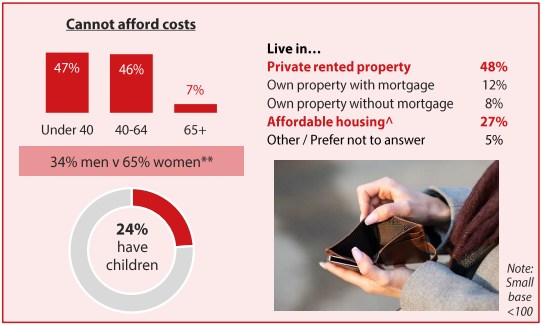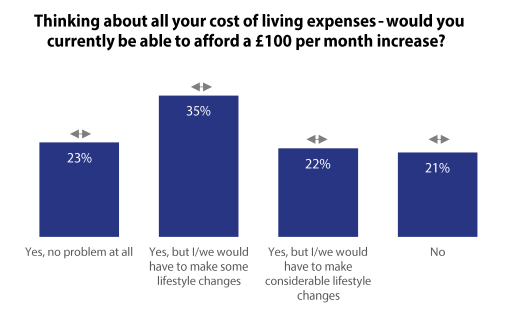

There is a "striking divide" between the rich and the poor in Jersey, according to a report that warns that three-quarters of islanders have found it difficult to meet the rising cost of living.
Market research and consultancy firm Island Global Research polled residents of Jersey, Guernsey, the Isle of Man and Gibraltar – and found that across jurisdictions, more than half of people said they were "less than comfortable".
In Jersey, three-quarters of respondents said they had found it difficult to meet some of their living costs.
And over half of the respondents said the rising cost of living was impacting their household.
The survey found that 10% of islanders "cannot afford their costs" and often have to skip essentials – going without food or heating, for example.
Meanwhile, 45% could cover essentials – but then had no money left for luxuries.

Pictured: Of those who couldn't afford their costs, more than 90% were under 65 years old.
Almost half (48%) of those who couldn't afford costs were renting their property, whereas of those who were "very comfortable", 69% owned their homes without a mortgage.
In Jersey, the researchers found that the cost of food was a particular burden.
Salvation Army Officer Richard Nunn said that the charity had seen increased demand on its food bank, starter pack scheme, and the number of free bowls of soup the charity gives out in its café daily.
As of 15 October 2024, the Salvation Army had already had more food bank users than during the whole of 2023.
So far this year, the food bank has had 2,859 visitors – compared to 1,040 in 2021, 1,470 in 2022, and 2,850 in 2023.
The survey asked islanders if they could afford an unexpected but necessary one-off payment of £100.

Pictured: Respondents were asked if they could afford an unexpected but necessary one-off payment of £100.
A total of 13% of respondents said they wouldn't be able to afford it.
Almost three-quarters of respondents said they had struggled to pay for, or cut back on, some of their expenses.
Meanwhile, 49% said they found it difficult to meet living costs. This number has gone down by four percentage points since 2022 – but those who are struggling are finding it more difficult to afford food.
Another 25% said they hadn't struggled with living costs, but had made cuts elsewhere - by, for example, taking fewer holidays or eating out less.
The biggest areas that people cut down on were:
Eating out: with 52% cutting down, paying late or borrowing money for meals out – a 7% increase since 2022
Holidays: with 47% of islanders affected
Clothes and shoes: which 38% said they had found difficult to pay for
Micro treats: which 34% said they had struggled with
A further 36% found it difficult to pay for food, 33% for home maintenance, 28% for electricity and heating bills, 24% for medical expenses, and 16% had struggled to repay their credit card expenses.
Some survey respondents said they fell "outside the bracket" for income support.
Others commented on the small amounts of support provided, with one writing: "It's shocking what people on long-term incapacity allowance are expected to live on."
Another said: "It seems the political power in Jersey is totally unaware of how hard ordinary people are finding life in Jersey now.
"The support is minimal and being taken up by charitable organisations rather than the government."
Mr Nunn said that both government and charities "need to be constantly aware of the needs of people, especially those more vulnerable to food poverty".
He explained: "Our experience is that it is really easy for people in Jersey to fall into food and fuel poverty through circumstances beyond their control – rising prices and cost of living, changing cost of housing, etc.
"We all need to look for ways and work together to respond appropriately and quickly, to meet the needs of struggling households."
He added: "We are privileged to be working with many agencies and are grateful for all the support we receive to be able to play our part in relieving poverty.
"For those people who find themselves struggling financially, help is available so please do get in touch.
"If you are among those who do not have these financial pressures, please do consider supporting charities working in this area."
In the survey, a number those who described themselves as comfortable said they would like to see GST removed from essential items.
Meanwhile, of those who said they couldn't cover all their costs, the biggest concern was over the high cost of housing.
Food was also a concern, with suggestions including bringing over budget supermarkets, selling more local produce, or opening a French supermarket.
Many said they were considering leaving the island.
"It's getting harder and harder to enjoy life," one said.
Another added: "[I'm] drowning and if I could afford to actually leave Jersey I would but now I can't even afford to save to leave."
One of the most comfortable respondents wrote: "I perceive there's already a big gap between the poorest and richest in the island.
"The rise in the cost of living has a drastic effect on the poor."
Comments
Comments on this story express the views of the commentator only, not Bailiwick Publishing. We are unable to guarantee the accuracy of any of those comments.